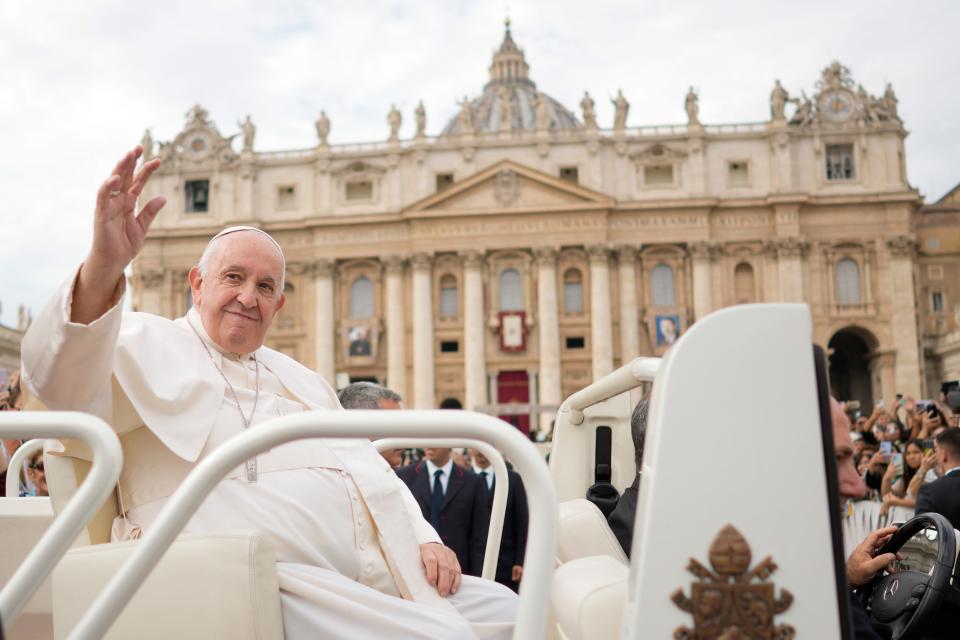Pope Francis is leading a quiet revolution. He's elevating women | Opinion
- Oops!Something went wrong.Please try again later.
On this 60th anniversary of the opening of the Second Vatican Council, we recall an aging, though enervated, Pope John XXIII convoking a seemingly monumental gathering of bishops in Rome. He never lived to see it to fruition. And two of his eventual successors tried to undo or ignore the reforms he set in motion.
Now Pope Francis, who was ordained to the priesthood in 1969 and the first pope ordained after the Second Vatican Council, picks up the mantle of languishing reform and breathes new life into this transformative council.
John and Francis have a lot in common. Both simplified the papacy. John did away with sitting on the papal throne and wearing a jeweled-encrusted-tiara. Francis moved out of the lavish papal apartment to reside with Vatican laborers in the nearby guest house. Both stressed the mercy of God rather than judgment, had a common touch and in their senior years came across as almost grandfatherly. But could intervene forcefully when necessary. John curtailed the power of the traditionalists in the curia who tried to sabotage reforms coming to the table. And Francis embarked on curial reform from the get-go nine years ago and recently released his reorganization, which is more mission, rather than, power-centered.
There are differences. Angelo Roncalli rose in the church’s hierarchy to become nuncio in non-Catholic countries until he served in France and absorbed the need for interfaith relations. Jorge Bergoglio, a rising Jesuit star and young bishop, then archbishop, worked in Latino circles to craft reform for Hispanic Catholics. John had big dreams for the church and set in motion a council to make it relevant for a new age and a new world. Francis has not made grand gestures but uses his Ignatian formation to give the church a discerning presence, which he calls synodality. Synod means path and he has embarked on a global listening and journeying process to offer laypeople a voice as stakeholders.

Since John’s papacy, the world has been besieged by interest groups advocating for all kinds of reforms. And society’s agendas infiltrated the church. One of them is the role of women, which was nascent but hardly as vocal back in the early 1960s. Today, feminists routinely picket outside St. Peter’s Square and risk arrest to address what they believe is a blatant injustice: no women as priests. Francis has convoked a second commission to consider ordaining women as deacons, which has solid foundation in early Christianity. But he seems hesitant and it may die on the vine.
And while women have been staffers in many curial congregations, now dicasteries, Francis has appointed about a dozen to administrative posts in the last two years. Mostly recently two women religious Italian sister Raffaella Petrini, French sister Yvonne Reungoat and one laywoman Maria Lia Zervino have joined the Vatican office that vets bishop candidates and can have the most profound impact on installing men who align with Francis’ pastoral approach. Petrini, a Franciscan, is already the new Secretary General of the Governorate of Vatican City State. He also appointed six women to manage Vatican finances. And a few laymen to several offices.
One theologian pointed out, "Management is not ministry." True, but seating women at the table along with cardinals and bishops is revolutionary and a small, first step. It also settles a chronic debate: baptism qualifies for service and not gender. Some members of the hierarchy view this as a slippery slope. Francis sees it recognizing unfinished Vatican II business. Perhaps women belong at more than a conference table.
The Very Rev. Alexander M. Santora is the pastor of The Church of Our Lady of Grace & St. Joseph, Hoboken, New Jersey and Dean of the Catholic churches.
This article originally appeared on NorthJersey.com: Pope Francis is leading a quiet revolution

